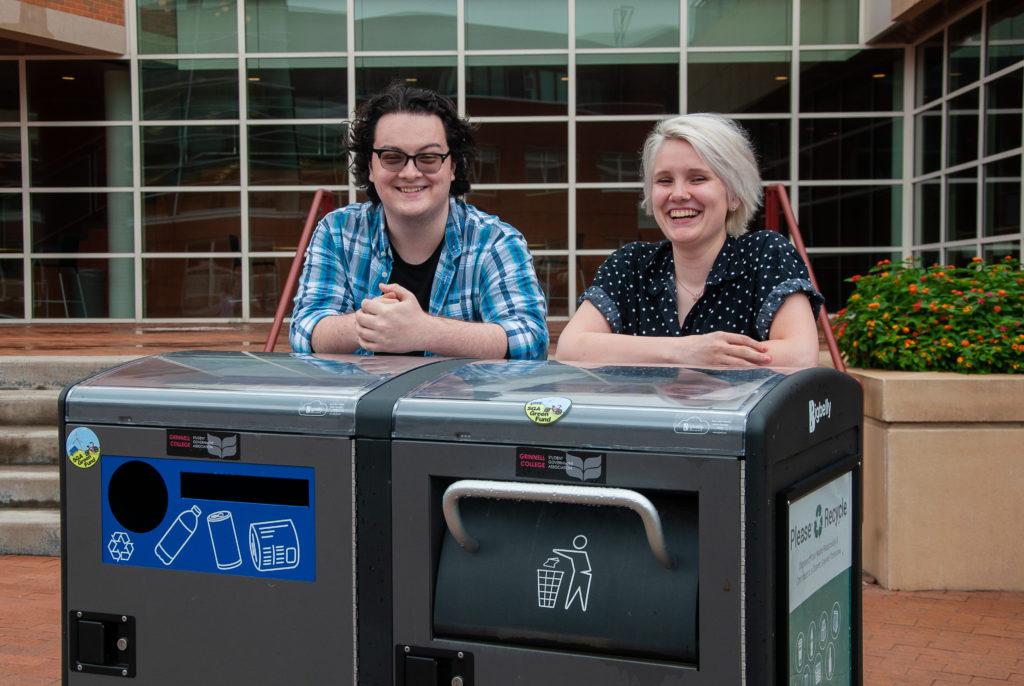SGA’s Green Fund is hard at work this semester creating a bike co-op, implementing energy and water usage tracking in dorms and other projects, including putting drying racks in campus laundry rooms and stringing up a clothesline between Eco House and Food House to dry clothes more sustainably.
The new bike co-op will allow students to check out bikes for a range of time, from an hour to a weekend, and is similar to bike-share programs found in some cities and at other colleges. However, at the moment, in contrast to other bike-share systems, the bike co-op will only have one bike pickup location in Clark pit. Also, the Green Fund is looking for volunteers who are interested in fixing bikes to help out with the co-op.
Students will be required to use their Pioneer One Card to check out bikes from the co-op, which Green Fund co-chair Annabel Higgin-Houser ’20 said is meant to ensure that students are accountable for any damages they cause to the bikes that they check out.
This extra level of accountability aims to ensure that the new bike co-op is more successful than the College’s old “yellow bike” program. According to Higgin-Houser, the bikes were treated badly and rendered unusable because anybody was allowed to use a yellow bike with no way to track down who damaged them.
“If you saw one you had free reign to use it and [the bikes] were destroyed, and people said that, at a certain point, people put sticks instead of handle bars because the handlebars had been stolen or taken off and most of them didn’t have seats,” Higgin-Houser said. “It was just not exactly an ideally run program, so we’re trying to do something because there’s still a need for bikes, so we’re trying to fill that need.”
While progress is moving along with the bike co-op and Higgin-Houser hopes that bikes can be ready to use in the next few weeks, the Green Fund’s energy and water monitoring project is currently stalled.
The project’s end goal is to install meters in each dorm to monitor the amount of water and electricity used, and make that information available on an online platform to help the College and students better understand resource consumption on campus. It requires that the electricity on each side of campus be shut off in order to install the monitoring equipment, and the Green Fund has not yet been able to coordinate an appropriate time to shut off electricity with Facilities Management. Though there are currently monitoring devices in Eco House, none are present in campus residence halls.
Higgin-Houser is especially interested in enacting resource tracking because many other liberal arts schools similar to Grinnell have implemented similar tracking on their campuses. “I’m really interested in doing a lot of the resource tracking that other schools do,” she said. “Almost every peer institution — Carleton, Pomona, Oberlin, all of them — they do really good resource tracking for all their buildings.”
Higgin-Houser said that she hopes that Grinnell can eventually implement resource tracking and create an event similar to Oberlin’s “Eco-lympics,” where the dorms track their resource consumption for a period of time and the dorm that uses the least is awarded a prize.
While resource tracking is perhaps the largest project that the Green Fund has taken on, it also exists to fund smaller pilot projects. Because Green Fund is now in its third year of operation, some of its smaller-scale projects are starting to reach a point where they are ready to be applied to the whole campus and, Higgin-Houser believes, be paid for by the administration.
One example of a pilot project is a compost in dorm kitchens, now implemented in ten dorms. Though the composting is currently done by student volunteers, Higgin-Houser would like there to be a paid composter position and for the program to be taken over and run by Facilities Management and the administration.
“We are in a bit of an interesting phase with our committee right now because we have been piloting projects,” Higgin-Houser said. “This will be our third year now, so a lot of our projects might be transitioning to the next phase where we have the administration start paying for them and running for them rather than us.”
Higgin-Houser is upset by the College’s recent decision to choose to pursue other methods of increasing sustainability on campus rather than divesting from fossil fuels. This decision has been a major motivating factor in her desire to increase sustainability on campus. “I’m disappointed and saddened that we’re not divesting,” she said. “But it also just makes me more motivated to do more sustainability work because if the school says they’re going to improve their sustainability despite not divesting, they better do it.”


























































